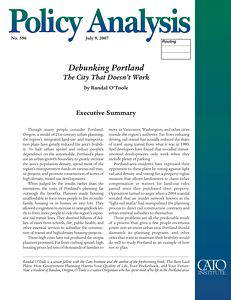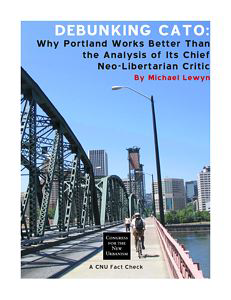No Light Rail in Vancouver!
Debunking Coercion Part 1
The Debunking That Doesn’t Work

The Congress for the New Urbanism can’t decide whether it favors coercion or not.
The group believes that New Urban designs — high-
One of the first things CNU did when it was founded in the early 1990s was publish a list of “New Urban basics” saying, “All development should be in the form of compact, walkable neighborhoods and/or districts.” Another document, called the Charter of the New Urbanism, held that existing suburbs should be reconfigured along New Urbanist principles. This doesn’t offer much choice for people who don’t want to live in compact developments.
The charter adds, “Development patterns should not blur or eradicate the edges of
the metropolis.” In other words, the 2-
Not everyone in CNU supports coercion. CNU co-
Another CNU co-
Duany managed to convince CNU to take the more coercive language out of its charter and other documents it has on its web site (though they can still be found on other New Urban web sites). In debates with the Antiplanner, New Urban leaders such as John Norquist maintained that they do not advocate coercion and that the seemingly coercive language that had been on their web site was merely aspirational.
If the Congress for the New Urbanism does not support coercion, however, then why
do they defend Portland? Portland and Oregon have adopted some of the most systematically
coercive plans in the nation. Rural landowners are not allowed to build a house on
their own land unless they own 160 acres, actually farm it, and actually earn $40,000
to $80,000 (depending on soil quality) per year farming it. Many urban homeowners
have found their neighborhoods of single-
Portland’s plans also depend heavily on tax subsidies to get the kind of development New Urbanists favor. Any plan that says, “We are going to take billions of dollars from taxpayers and give it to a much smaller group of developers who also happen to be campaign contributors” has to be considered coercive.
By combining the urban-
I wrote about these problems in a Cato paper titled “Debunking Portland: The City
That Doesn’t Work.” The Congress for the New Urbanism felt compelled to defend this
coercive regime with a paper titled, “Dubunking CATO: Why Portland Works Better Than
the Analysis of its Chief Neo-
Okay, first of all, “neo-
The writer of CNU’s paper, one Michael Lewyn, answers this question on page 11 of
his critique, where he claims that I support big-
1. I quoted a letter from the Federal Highway Administration critical of Portland for failing to plan for the region’s present and future transportation needs. Apparently, in Lewyn’s universe, libertarians can’t even quote government officials without compromising their principles.
2. I pointed out that Portland planners rejected a Congressional earmark aimed at relieving congestion. Lewyn reads this as an endorsement of earmarks, but my point was that the region’s planners oppose congestion relief, not that Congress should earmark transportation funds.
3. I rejected regional planning in favor of local planning, and specifically preferred homeowner association covenants over zoning. But Lewyn feels that even voluntary homeowner associations must be a violation of libertarian principles. Apparently, he doesn’t understand the value libertarians place on voluntary associations and contracts.
I am on record as supporting highway tolls, privatization of highways, elimination of all zoning rules, and (as an interim measure) allowing neighborhoods to opt out of zoning and write their own covenants. These can in no way be construed as big government measures.
To be fair, I am also willing to support government transportation projects — provided
they are user-
“When government favors cars, O’Toole is a fervent believer in the wisdom of Big
Brother,” claims Lewyn. Hardly. I have opposed sales taxes and other non-
The term “neo-
“Even if Goldschmidt is a bad man,” says Lewyn, Portland’s New Urban policies are
not “obviously related to Neil Goldschmidt’s alleged [again with the "alleged" -
Lewyn makes more substantive comments on transportation and land-
21
Reprinted from The Antiplanner

